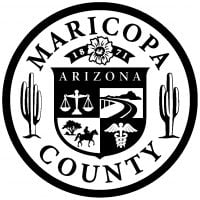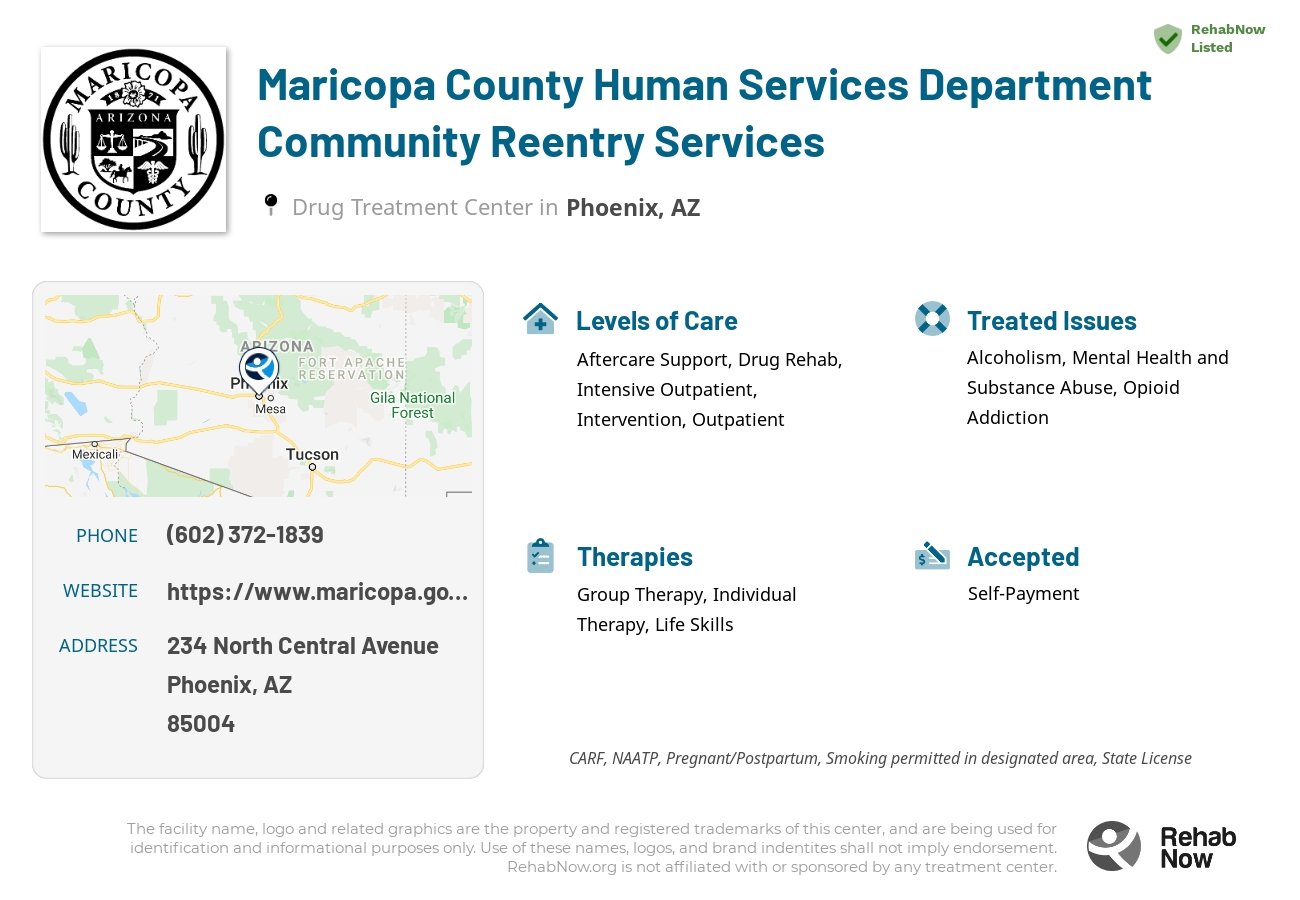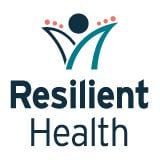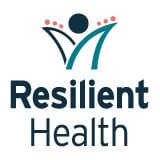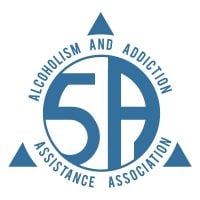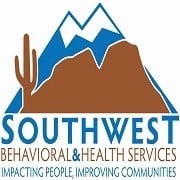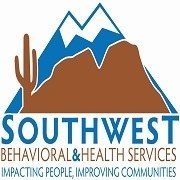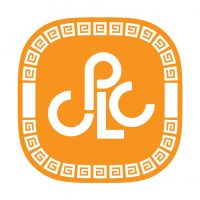Maricopa County Human Services Department Community Reentry Services
Drug Rehab Center in Phoenix, Arizona
Maricopa County Human Services Department Community Reentry Services provides comprehensive, evidence-based treatment for individuals in Phoenix, AZ struggling with substance abuse, alcoholism, dual diagnosis, and opioid addiction, utilizing a variety of therapeutic methods and services tailored to each individual's specific needs.
About Maricopa County Human Services Department Community Reentry Services in Arizona
Maricopa County Human Services Department Community Reentry Services in Phoenix, Arizona, assists individuals reentering society from incarceration, as well as victims of crimes or those on parole, with a focus on overcoming addiction. This community-based organization prides itself on its outpatient program designed for substance abuse treatment and dual diagnosis, offering a path towards recovery without the need for inpatient care.
- Offers a comprehensive outpatient program that supports addiction recovery along with dual diagnosis treatment, housing, and victim services.
- Tailored addiction treatment plans and therapeutic options are available for those battling substance abuse, ensuring personalized care.
- Accepts private insurance, encouraging individuals to discuss their needs and verify coverage for care.
Accredited by SAMHSA, Maricopa County Human Services Department Community Reentry Services emphasizes evidence-based treatment methods. Through their outpatient addiction program, individuals seeking sobriety receive support from a team experienced in handling substance abuse, alcoholism, dual diagnosis, and opioid addiction.
Focusing on substance abuse and alcoholism, including dual diagnosis and opioid addiction, the program utilizes group therapy, individual therapy, and life-skills training. Offering different levels of care, from intensive outpatient to long-term residential support, this program addresses specific addictions with a robust approach to treatment.
Genders
Ages
Modality
Additional
Conditions and Issues Treated
Opioid addiction treatment should be done in a medically supervised drug rehab. While taking opioids, users will typically use other substances to enhance the effects of opioids or to reduce the adverse effects of opioid use. Opioid addiction treatment will include detoxification and drug rehab counseling to help both the user and their loved ones learn how to live a successful sober lifestyle.
Treatments such as methadone, buprenorphine, and naltrexone are three medications that can help treat opioid addiction. These drugs work on the brain’s pleasure center and reduce cravings and the effects of illicit opioids such as heroin. These drugs can be either given orally or by injection. Individual drug rehab counseling sessions can be helpful to discuss any questions or concerns with the drug treatment program. This counseling will also help the user set goals for when they finish drug rehab.
Opioid addiction recovery is a long process. Many of the changes to the brain caused by opioid use cannot be undone, but with time and the proper treatment, a person can return to normal function. After detox, treatment will include drug rehab counseling and entering a halfway house or sober living community. Aftercare is critical to long-term recovery, as it helps the user avoid relapsing and entering back into drug rehab.
Levels of Care Offered
This center offers a variety of custom treatment tailored to individual recovery. Currently available are Aftercare Support, Drug Rehab, Intensive Outpatient, Intervention, Outpatient, with additional therapies available as listed below.
Intensive outpatient treatment is a type of comprehensive addiction care. Unlike conventional residential treatment programs, the patients live at home during the recovery process. This means that one can continue working and caring for their families. These also allow people to keep pursuing their studies while also working on their sobriety.
Outpatient treatment can help one transition to normal life from the round-the-clock supervision and treatment available during inpatient treatment. It is an excellent tool to ensure long-term recovery. However, it is essential to note that intensive outpatient treatment in itself does not remove patients from the real-world setting. This means there’s always a higher risk of coming across environmental triggers. To further prevent relapse, an outpatient treatment center should be able to provide ongoing support services.
Once the patient is enrolled in an intensive outpatient treatment program, they will be expected to attend therapy and group meetings daily for a stipulated period. The frequency and duration of each session will depend on the patient’s needs and level of addiction. This can help curb the habit and deal with underlying issues that led to it. Most of these professional treatments are designed to allow patients to structure their daily schedules in a way that is conducive to recovery.
“Outpatient treatment is ideal for those who have a lower intensity addiction. It’s also suitable for those with a supportive environment and those on a tight budget.
Outpatient treatment can be considered the lowest intensity level of addiction treatment. It is ideal for early phase addiction or lower intensity addictions. It may involve weekly sessions instead of daily. Peer group support, 12-step programs, and individual counseling may still be used and anti-addiction medication.
Drug rehab intervention aims to make sure patients understand the risks of their addiction and possible outcomes. They must learn how their addiction affects those around them and allow a therapy session to help move past the physical symptoms. They often include psychotherapy or behavioral therapy, group therapy, family counseling, and peer support.
Aftercare support is vital to those who have completed a drug or alcohol treatment program. This support comes in individual and family counseling, treatment of psychiatric and other medical conditions, and medications to reduce cravings. It helps recovering addicts adjust to normal day-to-day activities and can last for a year or longer.
The majority of drug and alcohol addicts who receive aftercare treatment do not relapse. It is estimated that without aftercare, the relapse rate will be between 70 to 90 percent for most people. Aftercare is the final stage in addiction recovery, but it will also help maintain sobriety if relapse does occur.
Therapies & Programs
No single treatment works for all addicts; therefore, the goal of treatment and therapy should be to find what works best for each individual. Some people requiring addiction treatment may only need a few weeks of inpatient care. Others will require long-term residential care. Tolerance and withdrawal levels vary from person to person and thus affect the intensity of the treatment needed.
If an individualized approach to treatment and therapy is not offered, addicts may fail to reap benefits from their efforts. Professionals must customize plans according to their patient’s needs, limitations, and strengths. The goal of all forms of addiction treatment should be for addicts to find healthy ways to cope with their addiction and its underlying causes.
Group therapy is held in a safe, controlled setting where patients can feel comfortable sharing their struggles and gaining perspective through shared conversations. It takes place in a group rather than one on one to prevent feelings of isolation or being unique in their situation while creating an environment for addicts at Maricopa County Human Services Department Community Reentry Services to develop fellowship, accountability, and support. Group therapy is an important tool in recovery that prevents cravings that prompt a return to active addiction.
Life skills training is beneficial for addicts in recovery because it helps them learn how to take care of themselves and improve their quality of life, which can promote feelings of purpose and motivation.
This type of treatment works by teaching individuals life-enhancing skills that support positive living, including:
- Healthy lifestyle habits
- Skills to effectively manage stress
- Effective communication skills to help them get their needs met without turning to drugs or alcohol
- Money management and budgeting skills so they can continue to take care of themselves after treatment ends.
Payment Options Accepted
For specific insurance or payment methods please contact us.
Maricopa County Human Services Associated Centers
Discover treatment facilities under the same provider.
- Maricopa County Human Services Department East Valley Head Start in Mesa, AZ
- Maricopa County Human Services Department East Valley Career Center in Gilbert, AZ
- Maricopa County Human Services Department West Valley Career Center in Glendale, AZ
Learn More About Maricopa County Human Services Centers
Additional Details
Specifics, location, and helpful extra information.
Phoenix, Arizona 85004 Phone Number(602) 372-1839 Meta DetailsUpdated April 15, 2024
Staff Verified
Maricopa County Human Services Department Community Reentry Services Patient Reviews
There are no reviews yet. Be the first one to write one.
Phoenix, Arizona Addiction Information
Arizona has some of the highest rates of prescription drug abuse in the United States. Methamphetamines, heroin and morphine are among the most commonly abused substances. Prescription pain relievers were prescribed to 348 million people in 2012, enough to medicate every adult in Arizona for 2 full weeks. The number of people with substance use disorders in Arizona has remained relatively constant over the past few years.
In 2012, over 246,000 people were living in Phoenix dependent on or abusing drugs. This amounted to 10.8% of the city's population. In 2016, over 1,000 emergency room visits related to heroin and over 2,500 for cocaine. These numbers are only going up. There are many different rehabilitation facilities in the city and some 12-step meetings and support groups available for help.
Treatment in Nearby Cities
- Fort Defiance, AZ (233.0 mi.)
- Anthem, AZ (28.9 mi.)
- Arizona City, AZ (53.5 mi.)
- Las Vegas, AZ (258.5 mi.)
- Scottsdale, AZ (9.0 mi.)
Centers near Maricopa County Human Services Department Community Reentry Services
The facility name, logo and brand are the property and registered trademarks of Maricopa County Human Services Department Community Reentry Services, and are being used for identification and informational purposes only. Use of these names, logos and brands shall not imply endorsement. RehabNow.org is not affiliated with or sponsored by Maricopa County Human Services Department Community Reentry Services.
